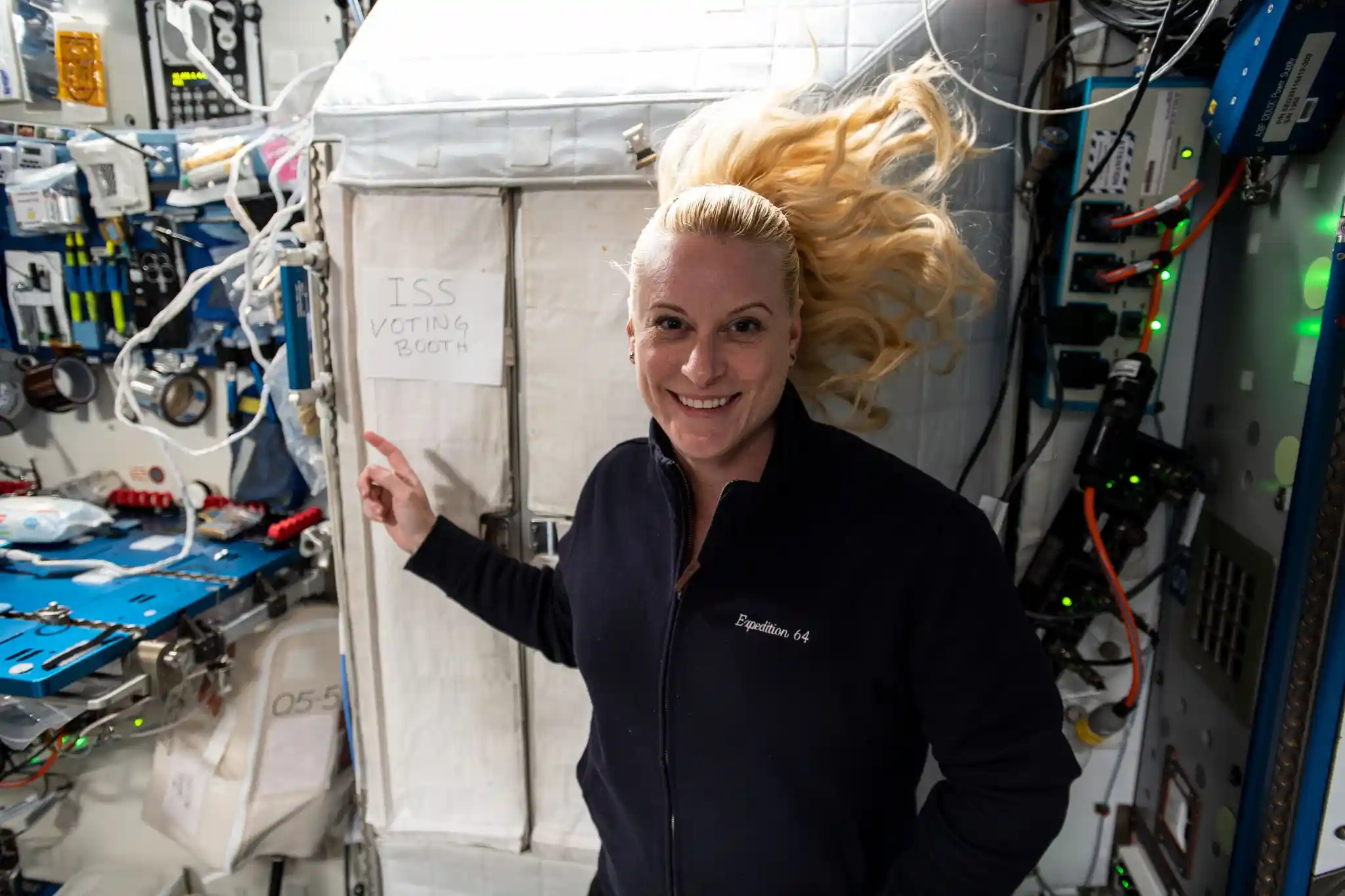
How We Tweaked the Law to Let Astronauts Vote from Space
Published on March 25, 2024
You’re floating 250 miles above the Earth, surrounded by the vast expanse of space, the mesmerizing blues and greens of our planet beneath you. The International Space Station (ISS) is your temporary abode, a large cutting-edge marvel of human engineering. But as you gaze down, you’re reminded that even in this otherworldly environment, you’re still bound by the responsibilities of being a citizen of Earth.
Back on Earth, another monumental event is unfolding—a presidential election that will determine the future of your country. You might wonder, amidst the awe-inspiring vistas and high-stakes experiments, can you still exercise your civic duty to vote from the final frontier?
The answer is a resounding yes—astronauts can cast their ballots even from low Earth orbit. This is achieved through a blend of state-of-the-art technology and ingenious adaptations of existing laws.
Making Space for Democracy
The legal framework enabling astronauts to vote from space emerged in Texas in 1997. The initiative to facilitate voting from space started when astronaut John Blaha, stationed aboard the Russian Mir space station, wished to vote in the 1996 presidential election. A plan by NASA to allow electronic voting was halted as Texas had no provisions for such a voting method at the time.
In response to this situation, the Texas Legislature passed a bill allowing NASA astronauts to vote from space. The law created an absentee ballot system for astronauts, permitting them to vote with the address “low Earth orbit”. This law was reportedly sponsored by a senator who was upset about the astronaut who missed voting in the 1996 presidential election.
The following year, NASA astronaut David Wolf made history as the first American to vote from space. He submitted his vote via encrypted email while aboard the Russian Mir space station.

Is this law relevant to all American astronauts?
That’s not the case. This specific law is only applicable to residents of Texas. Most American astronauts work at Johnson Space Center in Houston, Texas, so living nearby is a logical choice for them.
Garret Reisman, a former astronaut now a consultant for SpaceX, has said that the Clear Lake region is a favored residential spot for many in the astronaut community, along with their families.
With the rise of private space travel, the applicability of Texas voting laws to private astronauts working for companies such as Space X and Virgin Galactic becomes a key concern. Those who are Texas residents, even if not affiliated with NASA, can vote from space under this law. However, private astronauts from other regions must follow their own local voting regulations, which are for the majority not suited for off-planet workers.
For astronauts from other countries, if their home country does allow absentee voting or electronic voting, and it extends this provision to its astronauts in space, then theoretically, an international astronaut could vote from space too.

So what does the voting process look like on a space station?
Pre-Launch Preparation:
Before launching, astronauts need to indicate their intention to vote from space to their local supervisors. Similar to military members and other American citizens living overseas, astronauts are required to submit a Federal Postcard Application (FPCA) to request an absentee ballot.
Secure Ballot Transmission:
During an election, a secure ballot is sent to the astronauts by the Johnson Space Center. This ballot is specifically created for the astronaut and is sent via email along with credentials provided by the local county clerk. Once the ballot reaches space, it’s transferred to the Mission Control Center at NASA’s Johnson Space Center in Houston, Texas, from where it’s forwarded to the respective county clerk for casting.
Voting:
Astronauts vote from space via a secure and encrypted system to maintain the confidentiality and integrity of their ballots. This ensures that only the astronaut voting and the county clerk can access the vote. For the 2020 U.S. presidential election, astronauts set up a temporary “voting booth” in one of the sleeping pods on the ISS, as shown in the image. This private space mimics the traditional voting booths on Earth, allowing them to cast their ballots in total privacy.

Bottom Line
As you’ve probably realised by now, the ability for astronauts to vote even when off-world is more than a logistical curiosity; it is a symbol of the lengths to which democratic systems can and should go to ensure that every voice is heard and counted.
Far from a mere technical achievement, this capability serves as a testament to the resilience and adaptability of democratic ideals, even in the frontier of outer space.
With the next Presidential election taking place in November 2024, and missions such as SpaceX Crew-9 aboard the ISS and the Artemis 2 lunar flyby scheduled around the same time, it will be particularly interesting to see this capability in action.
In wrapping up, let’s reflect on astronaut Kate Rubins‘ insightful words: ‘If we can do it from space, then I believe folks can do it from the ground, too.’
This is a good reminder of the importance of participating in our democratic processes. So, wherever you are, remember to always exercise your civil rights and make your voice heard at every opportunity.

Space exploration has been a fascinating subject for me since a very young age. As a child, astronauts were my heroes, so it was inevitable that a part of my website would be dedicated to astronauts and their space missions.
Explore more astronaut stories 👨🚀
This page is part of our collection of articles about astronauts. If you enjoyed the read, then you’ll love the following articles.



In the age of commercial space travel, the line between astronauts and space tourists has become increasingly blurred.

